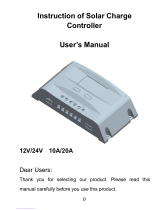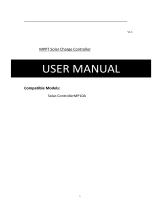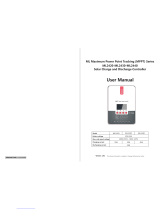Page is loading ...

High-End type wind solar hybrid
controller user manual
Type:JW-MPPT
version 2.0
1
Safety
1. Please keep and read the instructions during installation and before using the
product carefully.
2. The Installer should be experienced, and the installation process must be in
accordance with the user manuals strictly to ensure that the product works
normally.
3. Product should avoid long-time exposure to corrosive gas and moist
environment.
4. Never place this product in damp, rain, exposure to the sun, serious dust,
vibration, corrosion and strong electromagnetic interference, etc.
5. Do not disassemble this product or repair the shell.
2

Directory
Ⅰ. Product overview.......................................................................错误!未定义书
签。
Ⅱ. The model shows.......................................................................错误!未定义书
签。
Ⅲ.performance characteristics and protection function..................3
Ⅳcontrol panel instructions............................................................错误!未定义书
签。
Ⅴ. The system shows.....................................................................错误!未定义书
签。
Ⅵ. Operating rules..........................................................................错误!未定义书
签。
Ⅶ.The use of the environment........................................................错误!未定义书
签。
Ⅷ.Safety and protection..................................................................错误!未定义书
签。
Ⅸ.Fault analysis..............................................................................错误!未定义书
签。
X. Technical Parameters.................................................................错误!未定义书
签。
ⅪAfter-sales service.....................................................................错误!未定义书
签。
3
Ⅰ. Product overview
The controller is designed specifically for wind solar hybrid street light system,
can make the wind solar hybrid street light system in various resources to
achieve the best configuration, of course, the controller can also be used in
household system after some simple settings
The wind generator charging part and Solar charging part are independent
from each other, wind generator charging adopts booster MPPT technology,
which makes under low wind speed, the wind generator's electricity can still be
used; In the high wind speed or the wind generator power beyond the scope of
the battery and load absorption, the controller launches the unloading function
by dump load resistor, protects the system and controller, battery. Solar
charging use in series MOS tube PWM technology, which makes the power

consumption small, more stable.
Discharge part working mode can be set, light control mode,Period of time
control function ect., The user can set up according to the requirements on its
own combination.
LCD screen and four key operation mode, easy to understand, very
convenient.
Perfect protection function,including:lightning counter-attack,over-voltage
automatic braking, storage battery reverse connect and open circuit protection
Ⅱ. Technical note
1. When battery is fully charged but the charging is still continued by solar or
wind,at this time,we need to do discharge processing, otherwise it may cause
permanent damage to the devices;
2. When the power generation source does not have sufficient power support,
battery may be under-voltage and cannot support for loads normal working.At
this time, we also need to improve the power generation capability,in our wind
solar hybrid system, comparing to the wind generator power, solar power is very
stable power supply, so we had a wind solar hybrid controller mainly for wind
4
generator and design the booster MPPT charging technology as well as step-less
unloading function. PWM charging technology for solar charge.
Boost MPPT is mainly designed for the situation that most of the time in most
regions where wind energy is not enough to support the generator to generate
electricity to charge the battery. The specific working principle is: the voltage
generated by the fan under the condition that the wind speed does not reach its
rated wind speed, and The power does not reach its rated power. We use the
MPPT algorithm to make the power generated by the fan as much as possible by
collecting the voltage and current of the wind turbine in real time through the
means of a boost circuit to raise the voltage it sends to the charge voltage of the
system battery. Get used.
The step-less unloading function is mainly for the first case. When no
additional energy is needed, the extra energy will be consumed on dump load.
The controller has terminals for connecting the dump load. According to the
actual situation, we suggest that in areas with good wind energy conditions such
as the coast and open area, the dump load must be installed.In the inner-land
area, where wind is very big,we also recommend controller with dump-load.
Ⅲ. Performance characteristics and protection function
◆Intelligent design, simple structure, powerful control function, stable
performance, product safety and reliability.
◆Using MPPT fan charging method, the charging efficiency is more superior
than ordinary PWM method
◆Boost charging function solves the problem of low charging efficiency due to
fan's low wind speed (optional)
◆Use large LCD display, all parameters are visible
Ⅳ. Operating instructions
The installer (user) must have electrical theory knowledge and practical
experience, and strictly in accordance with relevant provisions of the manual
steps and manner.
5
1.Install

4-1 wiring diagram
6
7
Install step:
1 Unpack and confirm that controller is not damaged by shipping.
2 Install the controller in a suitable location. The necessary installation space
should be reserved during the installation to ensure the normal heat dissipation
of the controller, and the ambient temperature should not exceed the operating
Protection function
protection
function
Explain
notes
Solar reverse
charge
The voltage of the battery may be higher than
the terminal voltage of the solar array when in
bad light conditions such as at night,the
controller is equipped with anti-reverse
charging circuit to prevent the battery from
producing counter-charge to the solar
battery.
Battery
Reverse
It will cause a huge current when battery
reversed .Controller do not work until right
connection done.
Electronic
prevent
reverse
connection
Battery open
circuit
After long-term use, the battery may be open
or poorly contacted. The controller will protect
the device itself from damage after the
battery is opened.
Regularly
check the
connection
status.
Power
resistance size(mm)
L1±5
L2±5
L3±5
H1±2
H2±5
300W
190
210
230
43
90
500W
180
210
240
63
110

temperature range of the controller.
3 Use multiple copper core insulated conductors for installation. First, determine
the length of the wire. Ensuring the installation position, and to reduce the
electrical loss as much as possible, pay attention to select the wire specifications
as required.
4 Use a 4mm copper cable or more to connect the battery to the controller. Pat
attention for the positive and negative electrodes, not reverse.
5. After the above operations are completed, the two indicators on the panel of
the controller flash and the LCD screen lights up.
6 If the controller does not work properly, check whether the connection is
reversed and if the battery voltage reaches above 8V.
7. Select the appropriate copper core cable to connect the load to the controller.
Note that the positive and negative poles can be distinguished. If the positive and
negative poles are connected incorrectly, the load may be permanently damaged
because your load may not be protected against reverse polarity. This controller
can connect two loads as well, if there are two loads that need to be connected,
twist the positive terminals of the two loads together and connect them to the L+
terminal of the controller, and connect the negative terminal to the L1-, L2-
terminals of the controller. After connecting, observe whether the load is working
properly. If it is not working, observe whether the “out” indicator on the controller
panel is flashing. If it flashes, it indicates that the
8
battery is under voltage and it needs to be charged before it can work normally.
8. Connect the solar panel to the controller S+, S-. Note the polarity of the
positive and negative poles. If the pole is reversed, the controller will start reverse
polarity protection. If the connection is correct, the red LED on the controller
panel lights up (during daytime).
9. Connect the dump load to the controller, there is no distinction between
positive and negative poles.
10. Connect the fan and the controller. If it is a three-phase AC fan, the three
terminals have no distinction between positive and negative poles. If it is a DC
fan, connect any two of the three terminals on the fan side of the controller. Note:
When installing the fan, please make sure lower wind speed to avoid accidents.
2.Operation debugging
(1)Status Indication:
LED
Status
Show
CHARGE
ON
Charging
OFF
No charging
OUT
ON
normal
OFF
Battery over voltage
FLASH
Battery under voltage
4 - 2
(2)Button description
4-2
As shown in figure 4-2,
Button①:Press this button to enter setup interface or switch program;
Button②: Click this button to switch down in first views page,in the setup
interface click this button is to increase the parameter values, step 0.1 V each.
9
Button③: Click this button to switch up browsing on page views,in the setup
interface click this button is used to decrease the parameter value, step 0.1 V
each.
Button④: Click this button to exit the setup interface, and save the parameters.
(3)LCD screen (the default interface)
After user setting, in accordance with the specifications, general entered into the
following interface automatically (figure 4-3) :

4-3
shown Battery voltage.
represents the daytime for the time being (if it is night, shown );
Two represents charging and discharging respectively. For the
charging indicator, when there is current, it will show like “horse-racing” state.
When there is no current or the current is small, the indicator will disappear; for
the discharging indicator, when the battery is in the under-voltage state, the
whole flashing effect will be displayed. When in the normal state, the static effect
is displayed, and the indicator can be connected to the load. After the load is
connected, if a current is generated, the “horse racing” state is displayed.
represents the solar panels, power generation, according to the sun;
represents the battery, the number of inside represent the
battery capacity;
on behalf of the load, the load output will be lighting effects under the
condition of display;
10
represents the fan,it shown turning,when there is wind.
(4)Parameters to browse
User press down key to view the fan charging current "Ifan", the solar charging
current"Ipv", press the up button to return to the interface of a parameter.
4-4
The above three pages (Figure 4-4) are browse page. When the controller button
is not operated within one minute, the LCD backlight will automatically be
extinguished. Pressing any key after extinguishing will light the backlight again
for one minute.
(5)Parameter Settings:
The user presses the Enter key to enter the parameter setting interface. “Vfloat”
means that the float voltage value can be set at this time. The user can press the
up/down key to change the value. Each time the user can presses increase or
decrease 0.1V, the user can press the ESC key after the setting is completed.
Exit to browse the first page, you can continue to press the Enter key to switch to
the next item. The operation method is the same as above.The flow chart is
shown in Figure4-5
11

4-5
The controller has following items which can be set: float voltage "Vfloat",
undervoltage "Vunder" ,overvoltage "Vover", fan dump load Point
"Vfan_breaking", the operation method is the same mentioned before.
How to switch street lamp and household mode: as shown in Figure 4-5,
according to the method described in this section and switch to the fifth item, the
data area shows **H which mean “Time”, the user can press the up and down
key to change the value. Each press increases or decreases 1 and when the
number is 24, the controller indicates the 24-hour working mode ( home mode).
When the other numbers indicate the controller is the street light Mode, XXH
indicates the lighting time.
Above part is the standard function of the controller.
The following description is valid only for specific loads and standard controllers
do not include these features. Therefore, please ask the company before
ordering.
In the streetlight mode, the first time Tfirst and the power Pfirst setting description:
as shown in Figure 4-5, according to the method described in this section, switch
to the sixth item, the data area shows XXH, marked as Tfirst, the user can press
-12
the up and down keys to change the value. Each time you press increase or
decrease by one, the digit size is the time value; according to the method
described in this section, you switch to the seventh item, the data area displays
XXX (0-100), marked as Pfirst, the user can press the up and down keys to
change the value. Increase or decrease by 10 each time, this value represents
the power is XX% of full power. The second time Tsecond and power Psecond in
the street light mode are set in the same manner as the first time period.
V. Use environment
1. The controller should be used in a dry, clean and ventilated environment.
2. Avoiding under direct sunlight, exposure to sunlight, rain, moisture, dust, and
acid mist.
3, Placement position should be more than 0.5M away from the battery pack
4, Strictly prohibited in the use of flammable, explosive gas environment, beware
of flames and sparks!
5, Ambient temperature -25 °C - +55 °C.
6, Relative humidity of air is not more than 85% (25 °C±5°C).
Ⅵ.Safety and protection
The controller has various protection functions such as solar protection, reverse
battery, open battery, lightning protection, over wind speed and over voltage.
Note: Lightning protection refers to the last level of protection for the equipment.
For lightning-prone areas, multi-stage lightning protection systems composed of
special lightning arresters are required. If the user has this requirement, the
corresponding distribution system and costs must be increased.
13

Ⅶ. Dimension
14
15
Ⅸ.Technical Parameters
Model
JW1230
JW2430
JW2450
JW2460
JW2480
Rated voltage
12v/24v
24V
24V
24V
24V
Component power
100W
200W
300W
400W
400W
Power of fan
300W
300W
500W
600W
800W
Charging
Charging current
33.33A
21A
33.33A
42A
50A
Equalization
charge
14.4V±1%
28.8V±1%
Floating Charge
13.8V±1%
27.6V±1%
Equalization
charge recovery
13.2V±1%
26.4V±1%
Temperature
Compensation
-24mV/℃
-48mV/℃
Over
Discharge
Disconnect (DC)
10.8V±1%
21.8V±1%
Recovery (DC)
12.3V±1%
24.6V±1%
Over
Voltage
Shut off (DC)
16V±1%
32V±1%
Recovery (DC)
15V±1%
30V±1%
No-load
≤0.1A
≤0.1A
Voltage drop (DC)
≤0.5V
Control mode
Wind generator MPPT charge function, PWM uninstall
function, PWM over-current limiting
Boost charge
Flexible independent step-up circuit (optional)
Display
LCD
Show parameters
Voltage、charge current,battery voltage
Protected type
Lightning protection, solar cell anti-reverse protection, open
battery protection, reverse battery protection, over-wind
speed and over-voltage soft automatic braking protection
Heat emanation way
Radiator
Working Temperature
-25℃~+55℃
Height
≤5500m(2000m above the need to reduce power use)
Environment humidity
0~90%,No condensation
/




